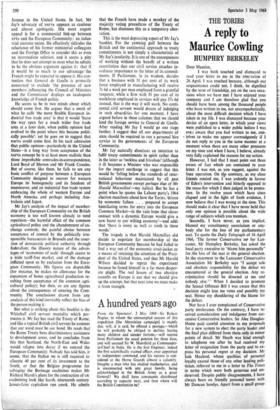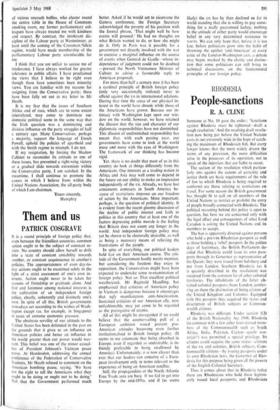A reply to Maurice Cowling
THE TORIES HUMPHRY BERKELEY
Dear Maurice, I was both touched and dismayed to read your letter to me in the SPECTATOR of 26 April. I was touched because, although our acquaintance could not, I think, be dignified by the term of friendship, yet on the rare occa- sions when we have met I have enjoyed your company and I am therefore glad that you should have been among the thousand people who have written to me, not unsympathetically, about the most difficult decision which I have taken in my life. I was dismayed because your device of an open letter, in which your views were published to a wider public before I was evea aware that you had written to me, con- trives to make me appear curmudgeonly if I do not reply to you in the same manner at a moment when there are many other pressures on my time and when I have, I believe, already very fully explained the reasons for my action.
However, I feel that I must point out three errors of fact which are contained in your letter. I was not, as you suggest, against the Suez operation. On the contrary, as my close friends remind me, I was ardently in favour of Eden's intervention and bitterly opposed to the cease-fire which I then judged to be prema- ture. In the twelve years which have since elapsed and in the light of fresh evidence, I now believe that I was wrong at the time. This should make it clear that I have never held that only one opinion is possible about the wide range of subjects which you mention., Secondly, I have never, as you implied, blamed my constituency association or any- body else for the loss of my parliamentary seat. To quote the Daily Telegraph of 16 April 1966, 'The former Conservative MP for Lan- caster, Mr Humphry Berkeley, has asked the local party executive to "blame him personally" for, the loss of the seat at the general election. In the statement to the Lancaster Conservative Association Mr Berkeley says "I accept sole and absolute responsibility for the defeat we encountered at the general election. Any re- crimination should be directed at me and nobody ,else." ' When I decided to promote the Sexual Offence; Bill I was aware that this decision might lose me votes and possibly my seat. Hence my shouldering of the blame for the defeat.
Nor have I ever complained of Conservative party intolerance. On the contrary. I have re- ceived consideration and indulgence from suc- cessive Conservative leaders. Sir Alec Douglas- Home paid careful attention to my proposals for a new system to elect the party leader and the final plan differed from them only in minor points of detail. Mr Heath_ was kind enough to telephone me after he had received my letter of resignation from the party and to ex- press his personal regret at my decision. Mr lain Macleod, whose qualities of personal loyalty exceed those of any other leading poli- tician, referred to me in a letter to The Times in terrns which were both generous and un- deserved. Despite public disagreements, I have always been on friendly personal terms with Mr Duncan Sandys. Apart from a small group
of vicious uncouth bullies, who cluster round the centre table in the House of Commons smoking room, my former parliamentary col- leagues have always treated me with kindness and respect. By contrast, the intolerant dis- cipline of the Labour party at Westminster, at least until the coming of the Crossman/Silkin regime, would have made membership of the parliamentary Labour party unendurable for me.
I think that you are unfair to accuse me of intolerance. I have always worked for greater tolerance in public affairs. I have proclaimed the views that I believe to be right even though these have sometimes been minority views. You are familiar with my reasons for resigning from the Conservative party; these have been fully set out in my letter to Mr Heath.
It is my fear that the issues of Southern Africa and of race, which are to some extent interrelated, may come to dominate our domestic political scene in the same way that the Irish question was a dominating and divisive influence on the party struggles of half a century ago. Many Conservatives, perhaps a majority, support the language of Enoch Powell, uphold the policies of apartheid and wish the Smith regime to triumph. I do not.
If my resignation, by forcing the Shadow Cabinet to reconsider its attitude to one of these issues, has prevented a right-wing victory or a gradual slide towards extremism within the Conservative party, I am satisfied. In the meantime, I shall continue to promote the causes in which I believe from within the United Nations Association, the all-party body of which I am chairman.
Yours sincerely, Humphry







































 Previous page
Previous page